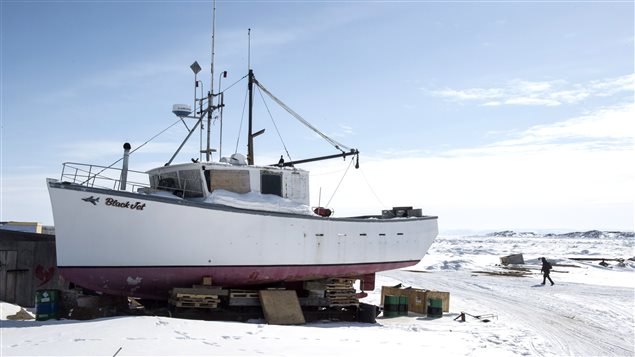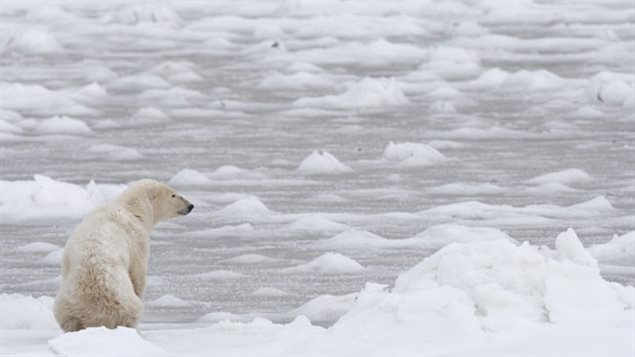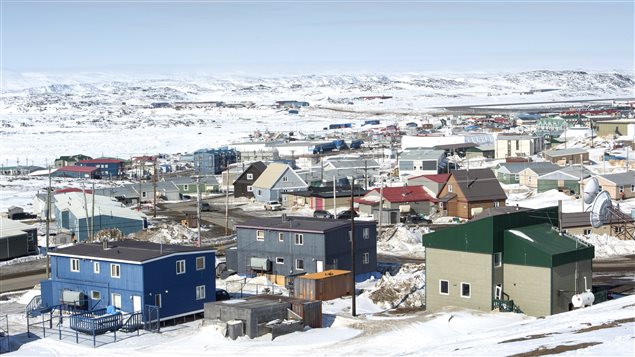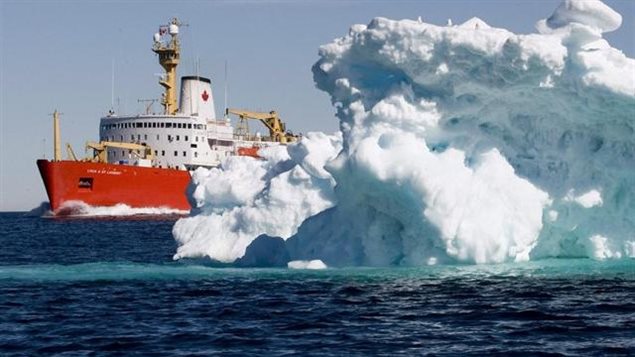Canada’s federal budget thin on Arctic substance and vision: expert

(Paul Chiasson/The Canadian Press)
When it comes to the Arctic, the federal budget tabled by the government of Prime Minister Justin Trudeau on March 22 lacks innovation and borrows heavily from the Conservative playbook, which the Liberals spent years criticising, says an expert on Arctic issues.
Heather Exner-Pirot, managing editor of the Arctic Yearbook, an open-access volume on contemporary Arctic issues, said the budget and the Liberal policy in general reflect emphasis on the “north” and the “peoples of the north” but articulate little of Canadian interests and goals in the Arctic.
Listen to the interview with Heather Exner-Pirot:
Finance Minister Bill Morneau did not mention the Arctic at all in his speech outlining the budget and the document itself has only a short paragraph dedicated to the Arctic.
The budget says the Arctic “is a vast and dynamic ecosystem as well as a place of tremendous natural resource potential upon which northern communities rely for their livelihoods.”
It says Ottawa is “committed to early engagement of Inuit people on potential offshore oil and gas activity in the Arctic and to ensuring that decision-making regarding the management of resources is evidence-based and considers possible impacts to the unique environment and wildlife.”
“Budget 2016 proposes to provide $19 million over five years, starting in 2016–17, to Indigenous and Northern Affairs Canada to collaborate with researchers and Inuit communities to gather existing research and traditional knowledge of the Arctic environment and conduct new research where gaps in knowledge exist,” says the document. “This work will help assess the potential environmental impacts of future oil and gas activity in three regions of the Arctic—the Beaufort Sea, Baffin Bay and Davis Strait, and Kivalliq, Kitikmeot and the Arctic Islands of Nunavut—and inform whether oil and gas activity should proceed in these regions.”
Climate change focus

While as might have been expected, the Liberals are putting in lots of money for climate change, their policy in the Arctic seems to be limited by climate and energy issues, said Exner-Pirot.
“That’s a very mainstream, I guess, a very narrow way of looking at the Arctic, and a very superficial way of looking at the Arctic,” Exner-Pirot said.
The budget calls for $8.4 billion over 5 years for Canada’s indigenous communities, including $2 billion on water and wastewater systems in First Nations and $2.6 billion over five years for primary and secondary education on reserves.
“When you look at what money filters towards the north or identified as going towards the north, it is very much of more but of the same,” Exner-Pirot said. “The same programs that we had under the Conservatives, same priorities we had under the Conservatives and maybe a little more money in some of these areas, so nothing transformative, not particularly innovative.”
‘A recreation of the south?’

Part of the problem of this conventional approach to northern development is that it simply tries to recreate a version of the services and infrastructure of the south, without asking ourselves what should be different in the north, Exner-Pirot said.
“It’s a very fine line: how do we have a high quality, high standard of living that is a northern standard and not a recreation of the south,” Exner-Pirot said.
While the budget doesn’t have as much infrastructure spending in the Arctic regions as some had hoped, it offers a big investment broadband Internet, she said.
However, the investment is targeted at rural and remote communities, without specifying what it will mean for the three northern territories – Nunavut, Northwest Territories and Yukon, Exner-Pirot said.
One of the other surprising allocations for the north is $10.7 million dollars over two years to invest in renewable energy to get northern communities off their dependency on diesel, she said.
“I don’t even know if you can do, you know, a single community to get them off the diesel with that kind of money,” Exner-Pirot said.
While the budget plans for significant investment in social housing in the north, there is nothing there for suicide prevention or mental health, which are pressing problems in the north, Exner-Pirot said.
Conservative playbook
The Liberals are also putting $10.1 million over four years into the Canadian Northern Economic Development Agency.
“That was really a Conservative priority and they don’t seem to be veering from that course at all,” Exner-Pirot said. “And also they renewed mining tax credits, which again they’re trying to promote and the territories are very interested in.”
Another Conservative program that is getting some fresh funding the Nutrition North Canada program, she said.
“After all the bad PR it received, all the criticism the Liberals gave it… they are pretty much keeping it exactly the same and even expanding it to some new communities,” Exner-Pirot said. “So again, more of the same.”
Arctic security

One area that she agrees with the Liberal spending plans is the decision they have made not to spend more than the government has already committed itself to on Arctic security, Exner-Pirot said.
“There isn’t a lot of real, urgent hard security needs; certainly we need to invest in the ability to provide stewardship and to be able to enforce our laws and provide a constabulary process as the Arctic opens up,” Exner-Pirot said. “But it’s not opening up as fast as some people think and the Russians are not really a threat.”
Related stories from around the North:
Canada: Obama, Trudeau announce plans to fight Arctic oil and gas pollution, Alaska Dispatch News
Finland: Japan, Finland agree to boost cooperation in the Arctic, The Indpendent Barents Observer
Iceland: Iceland blasts Arctic Five for exclusion from fishing agreement, Eye on the Arctic
Norway: Arctic Council aims to boost business, Barents Observer
Russia: Japan wants more Arctic cooperation with Russia, Barents Observer
Sweden: Arctic Council – From looking out to looking in, Blog by Mia Bennett, Cryopolitics
United States: Arctic remains refuge of friendly US-Russia relations, Alaska Dispatch News



